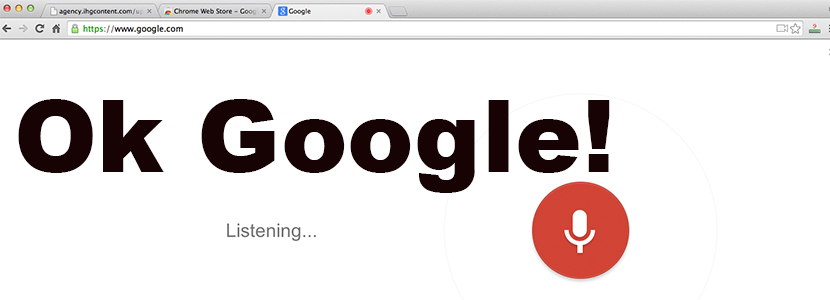Ok Google in Chrome Beta: The Progression of Voice Search

While we’re not quite at the level of the movie Her (yet), voice search is quickly becoming both more prevalent and more advanced. On February 27, Google’s voice search function—Ok Google—debuted as a built-in feature of the latest Chrome Beta. While users have been able to download Ok Google as a Chrome browser extension since November, the function is now actually built into the browser with no download necessary.
Voice search has long been a top priority for Google, and with this latest development, it’s clear that the hands-free search method will become even more widespread in the near future. So how is voice search affecting you and your business? Let’s start with the basics.
What Is Ok Google?
The Ok Google function enables users to conduct a search using voice commands only. Visit Google’s home page or a new tab in Chrome and say “Ok Google.” Then, simply speak your search term. The words will appear on the screen as you say them, and when you stop speaking, Google will pull up your search results. Often, Google will also speak the answer to you, although I’ve found this feature to be somewhat inconsistent.
One of the coolest features of voice search is the ability to reference previous search queries, resulting in a more conversational search experience. For instance, I can ask Ok Google, “How old is Joaquin Phoenix?” After my search results appear, I can ask “What was his most recent movie?” and Google will remember that I’m asking about Joaquin Phoenix.
In addition to performing hands-free search, Ok Google also enables you to set a timer or create a Google Now reminder. As a recent TechCrunch post points out, Google is continuing on their quest to create “the ultimate personal assistant.”
What’s Good?
The Chrome blog post about Ok Google uses cooking to argue the value of hands-free search:
“If you’ve ever tried to cook and search at the same time—say, when your hands are covered in flour and you need to know how many ounces are in a cup—you know it can be tricky. With the latest Chrome Beta, you can search by voice on Google—no typing, clicking or hand-washing required.”
As a serious cookie-baking fanatic, I was immediately on board with this. (Of course, Google conveniently skips over the fact that you do have to use your hands to get to the Google home page or a new Chrome tab, but I’ll let that slide.) In addition to being convenient, hands-free search is also quicker, and you don’t have to know how to spell all the words in your search term—spelling bee flunkies, rejoice! Plus, the fact that Ok Google references previous queries makes search even easier.
What’s Bad?
What could possibly be bad about having a personal assistant ready to listen to your questions 24 hours a day? Well for starters, I’m not convinced voice search is as necessary for desktop as it is for mobile. When you’re on the go—especially in the car—voice search on mobile is truly ideal. When I’m in the office, I’m pretty sure I’d just drive my coworkers nuts. Using voice search also takes some getting used to; I was testing it out at home and felt a little silly, even with no one there to judge me but my two very confused cats.
In addition, it seems like Google still needs to work out some of the kinks. As I mentioned, the search results don’t always include a spoken response when you’d think they would. Also, although voice recognition has been greatly improved over the last few years, it’s still not uncommon to have to search a term a couple times before Google gets it right. When searching “How will Ok Google affect content marketing?” I ended up with “How will okay Google of fat content marketing” and “How will okay Google effects content marketing” before I gave up and went with “Okay Google and content marketing.”
How Does Voice Search Affect Content Marketing?
Between Siri and Google Now, voice search is certainly not a brand-new concept, but the addition of Ok Google to desktop proves it’s becoming more prominent than ever. So what does this mean for your content marketing strategy? From an SEO perspective, we will continue to see search queries evolve from short, basic terms (Joaquin Phoenix movie) to longer, more detailed and more conversational terms (What was Joaquin Phoenix’s most recent movie about falling in love with a computer?).
Once you determine which questions are most likely leading viewers to your website, how do you optimize for those long, detailed questions? As this Search Engine Land article recommends, you can feature popular questions on your FAQ, Q&A or About Us page. In addition to optimizing your site for more conversational search terms, this also provides useful information to your viewers and helps you establish your company as a thought leader in your industry. Plus, if you offer viewers information they can’t pull directly from the SERP, they’re more likely to click through to your site.
Google also plans to roll out Ok Google support for additional languages, so offering multilingual content is more important than ever. You should also make sure you’re keeping your business information—address, phone number, hours, etc.—up to date across all social media channels. Especially with mobile voice search, users want and expect to find correct business information on the first try. If a potential customer tells Google to call your business, and the voice command fails because your phone number is not listed correctly, there’s a good chance that customer will call the next option in line.
I think it’s safe to say that voice search will continue to impact the world of content marketing. Try it out and let us know—are you in love with your OS?
Laurel Reese – Assistant Project Manager



